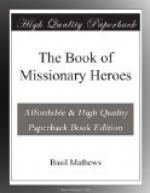“Recall the twenty-one years, give me back all its experiences, give me its shipwrecks, give me its standings in the face of death, give it me surrounded with savages with spears and clubs, give it me back again with spears flying about me, with the club knocking me to the ground, give it me back, and I will still be your missionary.”
FOOTNOTES:
[Footnote 35: Pa-poo-[)a].]
[Footnote 36: A-ee-v[)a]-ee.]
[Footnote 37: Poo-r[)a]-ree.]
[Footnote 38: Ee-[)a]-l[)a].]
[Footnote 39: He had spent some sixteen years in the South Sea Island of Rarotonga and had in 1877 become a pioneer among the cannibals of Papua (New Guinea).]
[Footnote 40: V[=a][=a]-boo-ree.]
[Footnote 41: Poo-o-t[)a].]
CHAPTER XIV
A SOUTH SEA SAMARITAN
Ruatoka (Date of Incident, about 1878)
It was a dark night and silent. The swish and lapping of the waters on the Port Moresby beach on the southern shore of the immense island of New Guinea, filled the air with a quiet hush of expectation.
In a little white house sat a tall, dark man with his wife. The man was Ruatoka. If you had asked “Who is Ruatoka?” of all the Papuans for miles around Port Moresby, they would have wondered at your ignorance. “Ruatoka,” they would have told you, was a “Jesus man.” He walked among their villages, and did not fear them when they threatened him with spears and clubs. He gave them medicines when they were ill, and nursed them. He spoke strong words to them which made their hearts turn to water within them when he showed that they did wrong. He often stopped them from fighting.
Ruatoka, with his wife, had sailed from the South Sea Islands with Tamate,[42] who was to them their great hero.
“My fathers of old were heathen, savage men on the island of Mangaia,” he would say. “The white men came to them and brought the story of Jesus. Now we are happy. But we, too, must go to the men of New Guinea, just as the white men came to us. To-day the New Guinea Papuans are savage cannibals and heathen. To-morrow they will know Jesus and be as happy as we are.”
So Ruatoka had been trained as a teacher and preacher as well as a house-builder and carpenter; and his wife was taught how to teach children as well as good housekeeping.
This was the brown man, Ruatoka, who sat that night in his little house at Port Moresby on the shore behind the great reef of Papua. Suddenly there came a knock at his door. The door opened, and the black, frightened faces of Papuans, with staring eyes, looked at him.
“What is the matter?” he asked.
And they told him that, as they came at sunset along the path from the people of Larogi to Port Moresby, they found by the side of the path a white man. “He was dying,” they said. “We were afraid to touch him. If we touched him and he died, his ghost would haunt us for evermore.”




